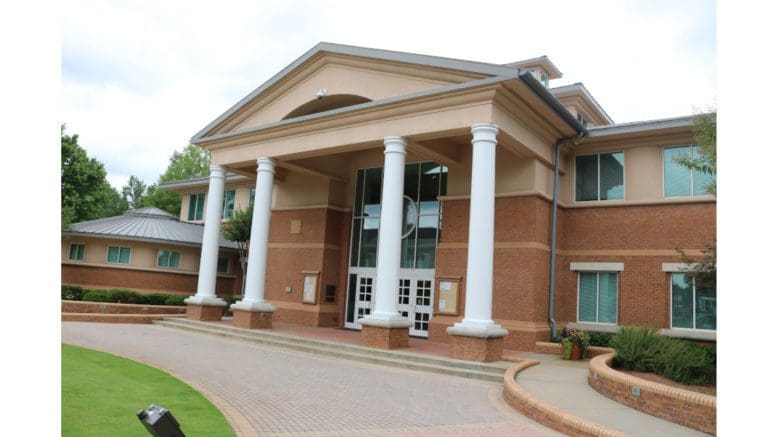by Arielle Robinson
Smyrna’s City Council tackled multiple issues at its first regular meeting of February, including but not limited to the potential demolition of Aunt Fanny’s Cabin, Black History Month and Councilman Austin Wagner’s resignation.
Mayor Derek Norton announced that Wagner recently resigned his position to work as Atlanta Mayor Andre Dickens’ deputy chief of staff.
Ward 2 is now vacant. Norton said that the qualifying dates for potential candidates will be March 8, 9 and 10.
The election will be the same day as the primaries — May 24.
At the meeting Monday, the mayor invited one candidate to come up.
Latonia Hines, a prosecutor and legal analyst, presented a bit of background on herself to everyone.
“I have been a proud member of this community for over 20 years,” Hines said. “I have worked in the Cobb Solicitor’s Office, the Cobb DA’s office. I’ve been a public servant during this time. It would be such a wonderful honor to be able to serve in this capacity in the city that I’ve lived in for the last 20 years. I look forward over the next few weeks being able to let more people know about me and what I can do for this community.”
The city also issued a proclamation in honor of Black History Month.
Councilman Lewis Wheaton said this year’s Black History Month theme is Black health and wellness.
He said it will focus on how the United States healthcare system has often underserved Black people.
The proclamation made mention of Harriet Tubman and Fanny Williams as two Black women who have helped contribute to the health of the community.
Tubman, the proclamation said, advocated for the equal treatment of Black people and founded a home for elderly and poor Black people.
Williams in the 1940s was the single largest donor to a Black Marietta hospital located on Montgomery Street, according to the proclamation.
Williams’ name and purported image have been highly talked about in recent months.
Monday night, the council voted 5-0 to extend the deadline for someone to make a proposal to buy the former restaurant bearing Wiliams’ namesake and remove it from city property.
If there is no buyer, Aunt Fanny’s Cabin will be demolished.
Councilman Glenn Pickens was absent.
The new proposal deadline is March 16 at 10 a.m.
Further discussion on the fate of the building, which the city says is in disrepair, will be held at the March 17 Committee of the Whole meeting.
The final decision will be decided and voted upon at March 21’s city council meeting.
In December, the city council voted 4-2 to accept a task force’s recommendation to demolish the building unless someone buys the cabin and removes it from city property.
The original deadline was February 1.
City Administrator Joseph Bennett said that the city received two proposals about the cabin that did not fit the criteria, so the council came to a consensus to extend the deadline.
The city’s decision to postpone the deadline also came in light of a coalition of various people — including former City Councilwoman Maryline Blackburn and the Cobb County NAACP — voicing their opposition to the demolition of the former restaurant.
Some opponents argue that the former restaurant, which was said to host racist images and representations of Black people, holds sentimental value.
On the other hand, members of the Coalition to Save Aunt Fanny’s Cabin, some of whom are Black, argue the cabin should be restored because it tells Smyrna’s history — Black history and women’s history in particular.
At a press conference last week in front of the aged structure, coalition members said they would prefer the city scan and repurpose it.
Monday night, Councilwoman Susan Wilkinson said that she had a few concerns about the demolition of the building.
Wilkinson previously voted against the measure passed in December.
She said it is a landmark of Smyrna and to preserve it would be to tell the story of Williams and the original restaurant owner, Isoline McKenna.
“The citizens of Smyrna raised funds in the late 1990s in order to preserve this structure and move it to our downtown,” Wilkinson said. “I think we owe them the respect of more consideration to this cabin, and the desire to keep it.”
She compared the city’s treatment of the cabin, where poor people have historically lived in the 20th century, to the historic Reed House, where wealthy citizens lived.
“The desire to get rid of Aunt Fanny’s Cabin is in stark contrast to the city’s purchase and renovating of the Reed House, former home of some of our wealthy citizens,” Wilkinson said. “The city purchased the Reed House and property for $1.8 million and then spent another $1.9 million renovating it, yet we are being told that a few hundred thousand dollars is far too great an expense to preserve Aunt Fanny’s Cabin, a modest building and landmark with a renown and importance that far exceeds the Reed House.”
Norton said that despite whatever side one is on about the issue, everyone agrees Williams should be memorialized.
He said there is just a “fundamental disagreement” on how to do it.
The mayor clarified on what city plans are to memorialize Williams.
“I’ve heard, ‘oh, y’all are just going to put a plaque out, or a statue,’ and nothing could be further from the truth,” Norton said. “We’re going to have a committee that’s made up of faith leaders, community leaders, council members who are going to bring a recommendation to the council about how to do it, and it’s going to be [where the cabin is].”
Norton also said he met earlier that day with Cobb NAACP President Jeriene Grimes, who spoke at last week’s press conference.
“After our lengthy discussion today and telling her … the plan forward to appropriately memorialize Fanny Williams, she told me she’s not married to that cabin and she is pleased that we are going to memorialize her …” Norton said. “In fact, I invited her to join the committee that will help make the recommendation and she accepted, so I’m very pleased about that. I look forward to the committee’s work.”
Norton said he will appoint the committee later this week.
During council comments, Wheaton said one of the most emotional aspects of Williams’ life for him was her death.
“While she was apparently so beloved by the family that employed her and happily used her name to open up a restaurant focused on the revival of old Dixie, she was buried in Jonesboro in an unmarked grave,” Wheaton said. “This administration, through the work of this task force, was the one that inquired about identifying that grave for a possible marker, which is not possible because of the disrepair of the cemetery. Now we stand considering the exact same problem — how do we honor her through the disrepair?”
[Editor’s note: At least two accounts have stated that Fanny Williams was buried in Jonesboro. But other accounts have stated she is buried in Southview Cemetery which is on Jonesboro Road in the City of Atlanta.
Southview would be more consistent with her membership in Wheat Street Baptist Church, in the City of Atlanta, since it was the primary burial place for Black residents of Atlanta during that time period.]

Arielle Robinson is a student at Kennesaw State University. She also freelances for the Atlanta-Journal Constitution and is the former president of KSU’s chapter of the Society of Professional Journalists as well as a former CNN intern. She enjoys music, reading, and live shows.





